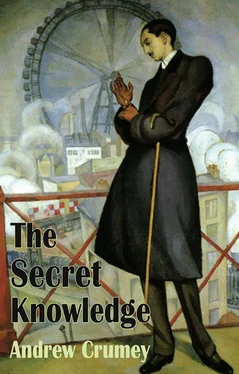“I know you can’t possibly agree with any of it,” Hannah says.
Adorno looks up, as mystified by her latest comment as by her first appearance. “Why do you say that?”
“Because he is arguing against everything that you and this so-called Institute claim to stand for.”
It is the kind of crude rhetoric he has come to expect from a woman whose philosophical career has advanced itself in men’s beds as much as in seminar rooms. She has given him five minutes to glance at the essay then insists he should feel defeated by it. In those five minutes he has probably understood more than she managed in the whole of her ferry crossing. He has seen numerous drafts and fragments of Walter’s Paris project; it appeared at one stage as though the proposed work would consist almost entirely of quotations, with hardly any theoretical explanation at all. At least this final essay shows where he was heading.
Since arriving in America, Adorno has divided his time between the Institute and a publicly funded investigation into the state of radio broadcasting. He is planning to write a book with Max Horkheimer explaining how the Enlightenment gave rise to its opposite, a form of mass deception nowadays propagated by a thriving culture industry. It will be published in 1947 and read by hardly anyone. Arendt will publish The Origins Of Totalitarianism four years later and it will make her internationally famous. He reads aloud another part of the essay. “Within three decades they managed virtually to erase the name of Blanqui.” Arendt stares blankly at him. “You know how strangely fascinated he was by Blanqui?”
This is a move on the board that Hannah has not been anticipating.
Adorno explains, “He wrote very excitedly to me about a forgotten book he’d found, L’Éternité par les astres. He saw it as profoundly important to his project.”
Planets where history goes differently, worlds created out of sheer envy and boredom, a universe where an alternative 1941 is happening right now to participants unaware of their genericity. Destiny, chance, fate: all are illusory in the magic-lantern show of history, the eternal now that makes everything feel new when really it is unconscious repetition. Adorno hears this universe every time he turns on the radio and is subjected to the latest dance tune, no different from the last. Modern existence is combinatorial, a rearrangement of terms robbed of meaning, and Walter was trying to reinvigorate meaning through intellectual montage; all he lacked was a coherent theory. The essay shows that had he been able to come to America, then together they would have elucidated that theory. Contingencies preclude that happy outcome, and this is why Adorno will not publish. It has nothing to do with personalities or the distasteful mess of life.
Arendt rises. “I have fulfilled my duty to my friend. Now you must respect your own obligation.”
“He didn’t give these papers in order that they would be made public in a wholly uncritical way. We shall have to look closely at all of this. Perhaps there is something that can be saved from the disaster.”
“It’s saved already.”
“Salvation is an immanent concept.”
“Like damnation?”
The cruellest twist is what both already know: that immediately after Walter killed himself, the Spanish authorities had a change of heart and decided the Jews need not have been detained after all, they would not be deported back to France, but were instead free to travel onwards as they had intended. Had he not given in to despair, Walter would have reached America with the others.
Adorno says, “He sent me a draft introduction for his Paris book, where he talked about Blanqui’s absurd cosmology. False histories offering infinite variety at the expense of value, multiplied lives worthless as dust. A desire for everything that instead yields nothing; the essence of modernity.”
“You could have done more to save him. We must at least make sure he did not die in vain.”
Adorno shakes his head. “He has already done that for us. In death he asserted the uniqueness of existence. There is only one world, and it is the world where our friend took his life. That he took it for no reason, that he need not have left his great work unfinished and in ruins, serves only to heighten the preciousness of what we are denied.”
Paige is getting ready to go to college, standing in the living room of her flat hurriedly finishing a cup of coffee when her phone rings.
“Hello, Paige?”
His tone’s friendly but she doesn’t recognise the voice. “Who is this?”
“My name’s Julian Verrine. I’m trying to get in touch with David Conroy. Do you know where I could find him?”
“Why should I?”
“You’re his student, aren’t you?”
“Not any more. They told me he’s on sick leave.”
He chuckles. “Is that what they’re calling it? No, David’s on another of his walkabouts, he does it now and again, goes AWOL and leaves everyone else to pick up the pieces.”
“You’re from the college?”
“I was meant to be arranging some performances, can’t get hold of him. Has he contacted you?”
“I heard he’d had a breakdown.”
“He’ll come up for air soon enough, always does.”
“How did you get my number?”
“David thinks very highly of you, says you’re the best he’s seen in years. A bit rough round the edges but definite star quality: his exact words.”
“Really? I’m amazed.”
“That’s why he gave you that piece to learn.”
“The Klauer?”
“You still have it?”
“No.”
He pauses. “We should talk. You’re obviously quite a talent.”
“Not exactly ready for the big time yet,” she laughs, warmed by flattery.
“There are opportunities even for someone at your stage. Let’s say we meet and throw a few ideas around.”
“But…”
“How do you feel about crossover?”
Does he think he can make her a pop star? “I don’t know.”
“I’m looking to showcase some new talent, young hopefuls, you appreciate I’m thinking aloud here, really we should talk. Lunch tomorrow? Even if it goes nowhere you’ll at least get a decent meal out of me.”
And in a moment it’s all arranged, she hangs up thinking this could be a psycho stalker or the biggest break of her life.
It’s three weeks since she showed up for a lesson with Mr Conroy only to be told he was unwell. Her tutor since then has been Mrs White, and when Paige arrives to see her she’s still thinking about Verrine’s call, wondering whether to mention it. They’re working on Chopin’s Scherzo in C sharp minor, Mrs White wants Paige to play it at a student recital later in the term. Mrs White is nearly at retirement age, has a grown-up daughter in Australia and a son who’s an anaesthetist; she’s fat and motherly, in a purple angora sweater with her spectacles hanging from a chord on her ample bosom. Paige can’t imagine ever being like her.
“You’re still using your old fingering,” Mrs White points out, interrupting Paige’s performance, saying it as if she were disapproving of the amount of salt being added to a pot of soup.
“Sorry,” says Paige. She’s been practising it exactly the way Mrs White wants, different from the fingering in the score and anything that would have occurred to Paige naturally, but supposedly better. Mrs White can do her own fingering perfectly and expects every one of her students to do the same. Paige tries again, they get along for a page or two.
“No ritardando there,” Mrs White reminds her. She chose the Chopin Scherzo for Paige to learn because, she said, it shouldn’t only be for those “big muscly boys”, and the unwanted image that came to Paige’s mind was of Sean, now going out with someone else according to social media and more particularly Ella. The Scherzo alternates between the muscly stuff and what Mrs White calls the “feminine” passages: Chopin, she maintains, was deeply in touch with his feminine side. These episodes are like flowing water, ripples on a lake; the other parts are solid rock. But whenever Paige tries to pursue this imagery she only ends up with Sean, herself, and the foetus.
Читать дальше











